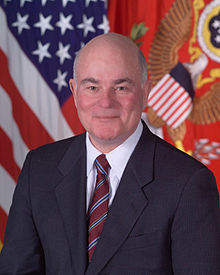Francis J. Harvey
Francis Joseph Harvey (born July 8, 1943 in Latrobe , Pennsylvania ) is an American politician ( Republican Party ). He was United States Secretary of the Army from 2004 to 2007 .
Studies and professional career
Harvey studied metallurgy and materials science at the University of Notre Dame . He graduated with a Bachelor of Science . He then completed a postgraduate course of study, which he completed with a doctorate from the University of Pennsylvania .
Between 1969 and 1997 he was employed by the Westinghouse concern , where he was promoted to president of the electronics systems group, president of the government and environmental services company, and finally to chief operating officer of the industrial and technology group. He was also Chief Executive Officer (CEO) of the defense company IT Group and a board member of several other companies.
During his long professional career, he has been involved in more than 20 defense programs that have included tanks, missiles, submarines, planes and satellites. Most recently, he was director and deputy chairman of the board of Duratek Inc., a company specializing in the pre-treatment of radioactive and other environmentally hazardous waste.
Secretary of the Army under President Bush
Harvey, who was also a so-called White House Fellow and assistant to the then Defense Minister Harold Brown for a year at the end of the 1970s , became a member of the Army Science Board in the late 1990s , which deals with the definition of future combat systems busy.
On September 15, 2004, he was nominated by President George W. Bush as the new Secretary of the Army . He then took up this position on December 2, 2004 as the successor to the previously incumbent Minister Les Brownlee . As Minister of the Army, he was the highest civil servant in the Army and was therefore responsible for all matters relating to the unit.
On March 9, 2007, Harvey was forced to resign over a due diligence scandal at Walter Reed Army Medical Center (WRAMC) after being asked to do so by Secretary of Defense Robert Gates a week earlier. The scandal also resulted in the resignation of the WRAMC Commander Maj. Gen. George W. Weightman , as well as the former WRAMC Commander and Medical Officer of the US Army, Lieutenant General Kevin C. Kiley .
Web links
- January 2005 article about his appointment as Minister of the Army
- Article in the International Herald Tribune of March 2, 2007 about Harvey's resignation
- Article in the Washington Post on March 3, 2007 about Harvey's resignation
| personal data | |
|---|---|
| SURNAME | Harvey, Francis J. |
| ALTERNATIVE NAMES | Harvey, Francis Joseph (full name) |
| BRIEF DESCRIPTION | American manager and Secretary of the Army |
| DATE OF BIRTH | July 8, 1943 |
| PLACE OF BIRTH | Latrobe , Pennsylvania |

